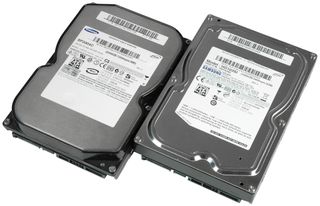Should You Be Looking For A Hard Drive Upgrade?

A Hard Drive Upgrade: Is Now The Time?
Most desktop PCs bought or built in the past five years are probably using hard drives in the capacity range of 80 GB to 250 GB. Recent price drops in the hard drive market mean that most current drive generation is more attractive than ever before. You can get 1 TB hard drives for less than $100 now.
Knowing that capacity may not be the only impetus for upgrading your hard drive, we "recreated" a three-year old system with a 200 GB hard drive and looked at what would happen if we replaced the drive with a modern terabyte model.

Capacity Quadrupled, Performance Doubled
It is safe to say that each and every hard drive selling today is far superior to older-generation drives, as improving recording technologies keep pushing forward capacities and performance. Other modifications, such as the interface transition from parallel ATA to Serial ATA 150 (and then 300 MB/s), also make a difference. But no individual feature—even Native Command Queuing or a larger cache—can make as much of a difference as simply stepping up from one drive generation to the next. In fact, the only reason why new hard drives aren’t getting faster to an even greater degree is an increased emphasis on power consumption and drive efficiency.
The bottom line is a simple recommendation that is almost always valid: when it comes time to buy a new hard drive, make sure the one you pick is a latest-generation model.
Capacity Upgrade: Check
The number one reason to purchase a new hard drive for an existing system, undoubtedly, is capacity, since a three-year old 200 GB hard drive fills up fast. In a year, most people typically add at least a few gigabytes of digital pictures, or even more data if video is stored on the drive. Add to that music, new applications, and so on. Unless you don’t touch digital media at all, you might need an additional 50-100 GB capacity per year, and enthusiasts and professionals may easily require far more. Hence, a hard drive replacement or upgrade every few years is absolutely warranted.
Stay on the Cutting Edge
Join the experts who read Tom's Hardware for the inside track on enthusiast PC tech news — and have for over 25 years. We'll send breaking news and in-depth reviews of CPUs, GPUs, AI, maker hardware and more straight to your inbox.
Performance Upgrade: Sure?
The next reason for replacing a hard drive would be performance. To illustrate this, we recreated a typical PC system using a Pentium 4 660 processor and a 915G-based motherboard from Asus with 1 GB of RAM; this represents an upper-mainstream system from the 2005-era. We selected a 200 GB Samsung Spinpoint P120 series SATA hard drive and ran several performance and power consumption benchmarks. Then we replayed the benchmark suite using a brand new 1 TB Samsung Spinpoint F2 EcoGreen to measure the difference.
Current page: A Hard Drive Upgrade: Is Now The Time?
Next Page The Test System: Pentium 4 660 On Asus' P5GDC-VMost Popular


